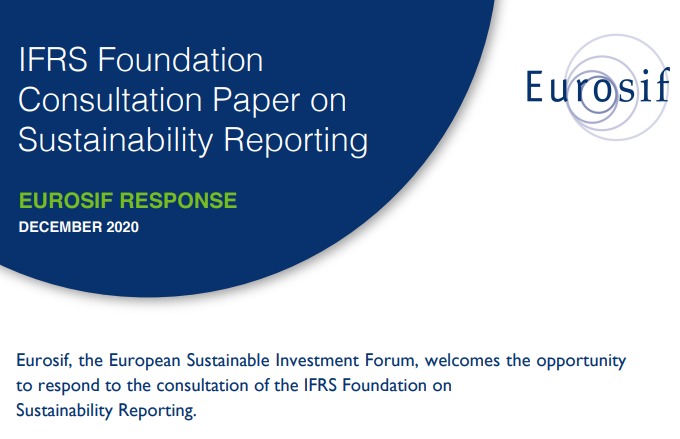News
Eurosif responds to the IFRS Foundation consultation on sustainability reporting standards
21 December 2020
Eurosif submitted today its response to the IFRS Foundation consultation on sustainability reporting standards. We welcome the initiative by the IFRS as there is a need for an internationally more coordinated and coherent approach to sustainability reporting. Our key recommendations are:
- Materiality - From the start, the ultimate future objective of the upcoming work on Standards should be ‘double materiality’, while acknowledging that different parts of the world may be advancing at different pace on the environmental and social materiality. Keeping the focus solely on financial materiality means that the SSB would from the start be less relevant for certain jurisdictions such as the EU.
- International coordination important, but not an end in itself – We believe the SSB could contribute to more international coordination of sustainability reporting, particularly when it comes to ‘financial materiality’ and the technical definitions and standards used to determine that. However, full international harmonisation should not become the board’s key goal in itself and should not preclude jurisdictions such as the EU to pursue a higher level of ambition with a more ambitious timetable.
- Scope of sustainability issues addressed – While we appreciate the rationale of the IFRS to suggest that the SSB should first and foremost focus on climate-related sustainability reporting, we believe that a narrow focus on only one sustainability objectives can lead to misguided policies and reporting. Sustainability is broader than climate or the environment (E) only and should also cover social (S) and governance (G) issues. Therefore, we believe that to be relevant, the SSB should commit to taking a holistic approach to sustainability from the start.
- Mission, Governance and Scope – Whenever new institutions are created, it is essential that the mission statement, scope of work and governance structure are well articulated and future proof. To meet that bar, the SSB mission should be to focus on financial as well as environmental and social materiality. It should commit to address sustainability in a holistic approach. And it should have transparent and clear decision-making processes where a diversity of stakeholder representation is guaranteed. Sustainability reporting will increasingly touch on issues which are at the core of the political and societal discourse in democratic societies. The SSB may therefore be subject to much greater scrutiny in its decision-making than the IASB and therefore its decision-making process should be robust enough to ensure that its standards are inclusive and accepted.
For questions and comments, contact: aleksandra.palinska@eurosif.org

